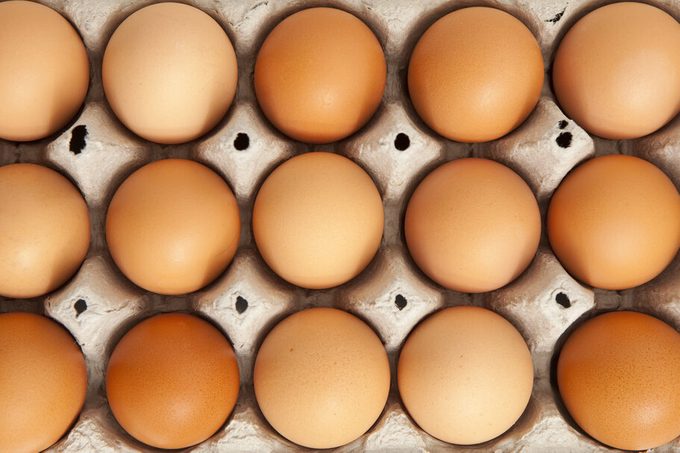Wondering why brown eggs are more expensive than white ones? Experts say it comes down to more than just the color.

Why Are Brown Eggs More Expensive Than White Eggs?

A few things we know about eggs: They are great for breakfast, you can cook them in tons of different ways and they can sometimes be tricky to crack. A few things we’re less clear on: Why do they still cost so darn much? What’s the difference between brown and white eggs? And why are brown eggs more expensive?
We spoke to Sharman Hickman and Jesse LaFlamme, two experts who work for egg producers, as well as registered dietitian Malina Malkani, RD, to find out what really drives the price difference and whether shell color has anything to do with it. Get ready to crack the truth about egg color, cost and what really makes one carton pricier than another.
Get Reader’s Digest’s Read Up newsletter for more food tips, humor, travel, tech and fun facts all week long.
What determines eggshell color?
According to Hickman, the community outreach manager for Hickman’s Family Farms, understanding why chickens lay different colored eggs is key. Genetics—not nutrition—determine the eggshell color, she explains.
Believe it or not, all eggs—yep, even the brown ones—begin white. But certain chicken breeds produce a pigment that imparts color when they lay an egg. LaFlamme, the director of Pete and Gerry’s Organic Eggs, says that depending on the breed, hens may or may not possess genes for the pigment, the natural chemical that coats the egg during the laying process and results in a colored shell.

Shell color can range from white to brown and even blue in some rare breeds, Hickman adds. But the colors don’t run deep. You might have seen that brown eggshells are not brown all the way through. In fact, they’re actually white on the inside.
There’s a trick to knowing what color egg a specific breed of hen lays: Look at the color of its ear feathers, LaFlamme says. Breeds such as the Leghorn chicken lay white eggs, while Orpingtons lay brown eggs, and Ameraucana produce blue eggs.
These differences in breeds don’t just impact color; they affect how many eggs a hen lays too.
Why are brown eggs more expensive?
Hens that lay brown or other colored eggs tend to be larger and require more feed and energy to produce that pigmented layer. Since those breeds cost more to feed, their eggs are more expensive.
So are brown eggs better for you?
Although eggs sometimes look and are priced differently, it’s impossible to know their nutritional makeup on shell color alone, according to Malkani. “Choosing between brown and white eggs is a matter of personal preference,” she says. “But it’s important for people to know that the color of the eggshell is related to the breed of the hen, not the egg’s nutrient content, flavor profile, quality or shell thickness.”
What does affect the nutrient content is the specific diet the hen is on. For example, hens fed a diet fortified with omega-3 fatty acids and vitamin D produce eggs that are higher in those specific nutrients.
No matter your preference, don’t judge an egg by its shell color. What matters most is how the eggs taste, how they fit into your budget and how they were raised. And when it comes to getting the most out of every carton, it helps to know how to tell if eggs are still good before you cook with them. That way, you’re not just picking the right eggs—you’re making sure they stay safe and usable too.
About the experts
|
Why trust us
At Reader’s Digest, we’re committed to producing high-quality content by writers with expertise and experience in their field in consultation with relevant, qualified experts. We rely on reputable primary sources, including government and professional organizations and academic institutions as well as our writers’ personal experiences where appropriate. We verify all facts and data, back them with credible sourcing and revisit them over time to ensure they remain accurate and up to date. Read more about our team, our contributors and our editorial policies.
Sources:
- Michigan State University: “Why are chicken eggs different colors?”
- University of Illinois: “Embryology Poultry Fun Facts: Did you Know?”
- Sharman Hickman, community outreach manager for Hickman’s Family Farms
- Jesse LaFlamme, director of Pete and Gerry’s Organic Eggs
- Malina Linkas Malkani, MS, RD, CDN, registered dietitian and bestselling author























